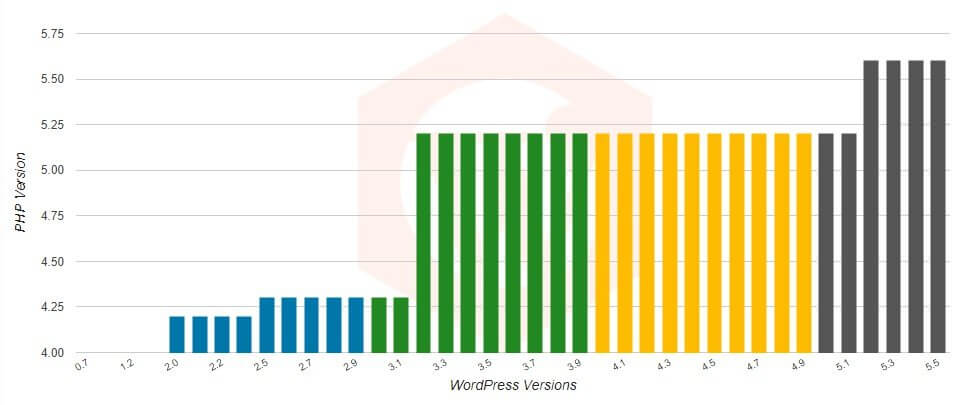PHP is a popular language used for making websites. It can do lots of different things like handling data in databases, creating whole websites, and managing content that changes.

PHP was made by Rasmus Lerdorf in 1995 and he shared it with everyone for free. Since then, it has changed a lot with new versions coming out.
Understanding Compatibility with Plugins and Themes
When you’re picking which version of PHP to use with WordPress, it’s super important to think about your plugins and themes. These are the special tools and designs that make your WordPress site awesome.
Why It Matters?
Your plugins and themes need to play nicely with the PHP version you choose.
Create Amazing Websites
With the best free page builder Elementor
Start NowIf they don’t get along, your site might not work properly or could even break.
Checking Compatibility
Before you decide on a PHP version, you should check if your plugins and themes are cool with it.
Some might work great with newer versions, while others might only work with older ones.
Staying in Sync
It’s like making sure all your friends are invited to the same party. Your PHP version needs to match up with what your plugins and themes are comfortable with.
If everyone’s on the same page, your WordPress site will run smoothly and look amazing.
PHP Version Compatibility with WordPress
Just like how PHP has changed over time, WordPress has also gotten better with new updates. When things change, their needs might change too. But not everyone updates their WordPress regularly.

WordPress started supporting PHP back in version 2.0. But back then, it only worked partly with PHP version 4.0. As WordPress improved, it needed newer PHP versions.
For example, starting from WordPress version 5.2, you must have at least PHP version 7.2. That's the new rule to keep things running smoothly.
Which PHP Version You’re Using?
Thankfully, WordPress was made for the modern times, so it's pretty easy to figure out what PHP version your WordPress site is using. Here are a few ways you can do it:
- Checking from your Control Panel: Most web hosting plans give you access to a control panel like Plesk or cPanel. In there, you'll find a section for managing web scripting or PHP directly. Click on that, and you'll see which PHP version your server is using.

- Checking in WordPress: This one's super easy. Just log in to your WordPress admin panel, go to Tools, and click on ‘Site Health’. Then, choose ‘Info’ at the top of the page and scroll down to ‘Server’. There, you'll see details about the server, including the PHP version.
- Using Command Line: If the other methods don’t work for you, you can try this. Go to the command line interface for your server and type in ‘php –version’ or ‘php -v’. This will show you the PHP version you have installed.
Assessing Support For PHP Versions
When you’re deciding on a PHP version for your WordPress site, it’s crucial to know if that version is still getting support. Here’s how you can check:
- Understanding PHP Support: PHP versions have a lifecycle, just like software updates on your phone. Some versions get regular updates and security fixes, while others might not.
- Checking Official Documentation: The PHP website has detailed information about which versions are still supported and which ones aren’t. You can visit their site or do a quick search to find out.
- Consulting Hosting Providers: Your web hosting provider can also help. They usually keep track of PHP versions and can tell you if the version you’re using is still supported.
- Considering Security Updates: Supported PHP versions get security updates regularly. If you’re using an unsupported version, your site might be vulnerable to hackers and malware.
- Planning Ahead: It’s important to choose a PHP version that’s still supported. This way, you’ll ensure your site stays secure and up-to-date with the latest features.
Compatibility with Older PHP Versions
When you’re deciding on which PHP version to use for your WordPress site, it’s not just about the latest and greatest. You also need to consider compatibility with older PHP versions. Here’s why it matters:
Legacy Plugins and Themes
Some plugins and themes might not work properly with newer PHP versions. They may have been designed or optimized for older versions of PHP. Using a newer PHP version could break their functionality.
Legacy Codebase
If your WordPress site has been around for a while, it might have plugins or themes that haven’t been updated in a long time. These older components may not be compatible with the latest PHP versions.
Deprecated Features
PHP regularly introduces new features and deprecates old ones. Plugins and themes that rely on deprecated features may not work with newer PHP versions. It’s important to check if your existing plugins and themes are compatible with the PHP version you’re considering.
Testing and Compatibility
Before upgrading to a newer PHP version, it’s essential to test your site thoroughly. This includes testing all plugins and themes to ensure they work as expected with the new PHP version. You may need to update or replace outdated components to maintain compatibility.
Balancing Security and Compatibility
While using the latest PHP version is crucial for security reasons, it’s also important to balance security with compatibility. If your site relies heavily on legacy plugins or themes that are not compatible with newer PHP versions, you may need to weigh the risks and consider alternative solutions.
Transitional Period:
If you decide to upgrade to a newer PHP version but still have legacy components that are not compatible, you may need to plan for a transitional period. This could involve gradually updating or replacing incompatible plugins and themes while monitoring your site for any issues.
In conclusion, compatibility with older PHP versions is an important factor to consider when choosing the right PHP version for your WordPress site. By understanding the potential challenges and planning accordingly, you can ensure a smooth transition to a newer PHP version while maintaining compatibility with legacy components.
Issues You Might Face With Older PHP Version
Here are some problems you might encounter if you're using an older PHP version:
Security Vulnerabilities: Older PHP versions may have known security flaws that could make your website more vulnerable to attacks from hackers and malware.
Lack of Compatibility: Some newer plugins, themes, or WordPress updates may not work properly or may not work at all with older PHP versions, leading to compatibility issues.
Slower Performance: Older PHP versions may not be as optimized for performance as newer versions, resulting in slower website loading times and overall performance issues.
Limited Support: Older PHP versions may no longer be supported by the PHP community or receive updates, leaving your website without access to important bug fixes and security patches.
Missing Features: Older PHP versions may lack newer features and functionalities that could improve the functionality and user experience of your website.
Benefits Of Upgrading PHP Version
In most cases, it's a good idea to keep your applications up to date, whatever you're using. As we mentioned earlier, WordPress keeps moving forward, and it needs PHP versions that can keep pace with it.
Here are a few important reasons why:
Better Performance: Each new PHP version tends to be faster than the last. For instance, PHP 7.4 can make scripts load 30-50% faster on average. This means your WordPress site can run much quicker.
Improved Security: Newer versions of software almost always come with better security. This doesn’t always mean new security features. Often, it involves fixing known security issues that have been discovered while the application is being used.
New Features: Sometimes, newer PHP versions bring in brand-new features or improve existing ones. This means your site might be able to do things it couldn’t before, thanks to these new functionalities.
Wrapping Up
In conclusion, choosing the right PHP version for your WordPress site is crucial for ensuring optimal performance, security, and compatibility.
By considering factors such as plugin and theme compatibility, support status, and the balance between performance and security, you can make an informed decision that will benefit your website in the long run.
Remember to stay updated on PHP releases and best practices to keep your WordPress site running smoothly and securely. With the right PHP version in place, you can maximize the potential of your WordPress site and provide an exceptional experience for your visitors.





